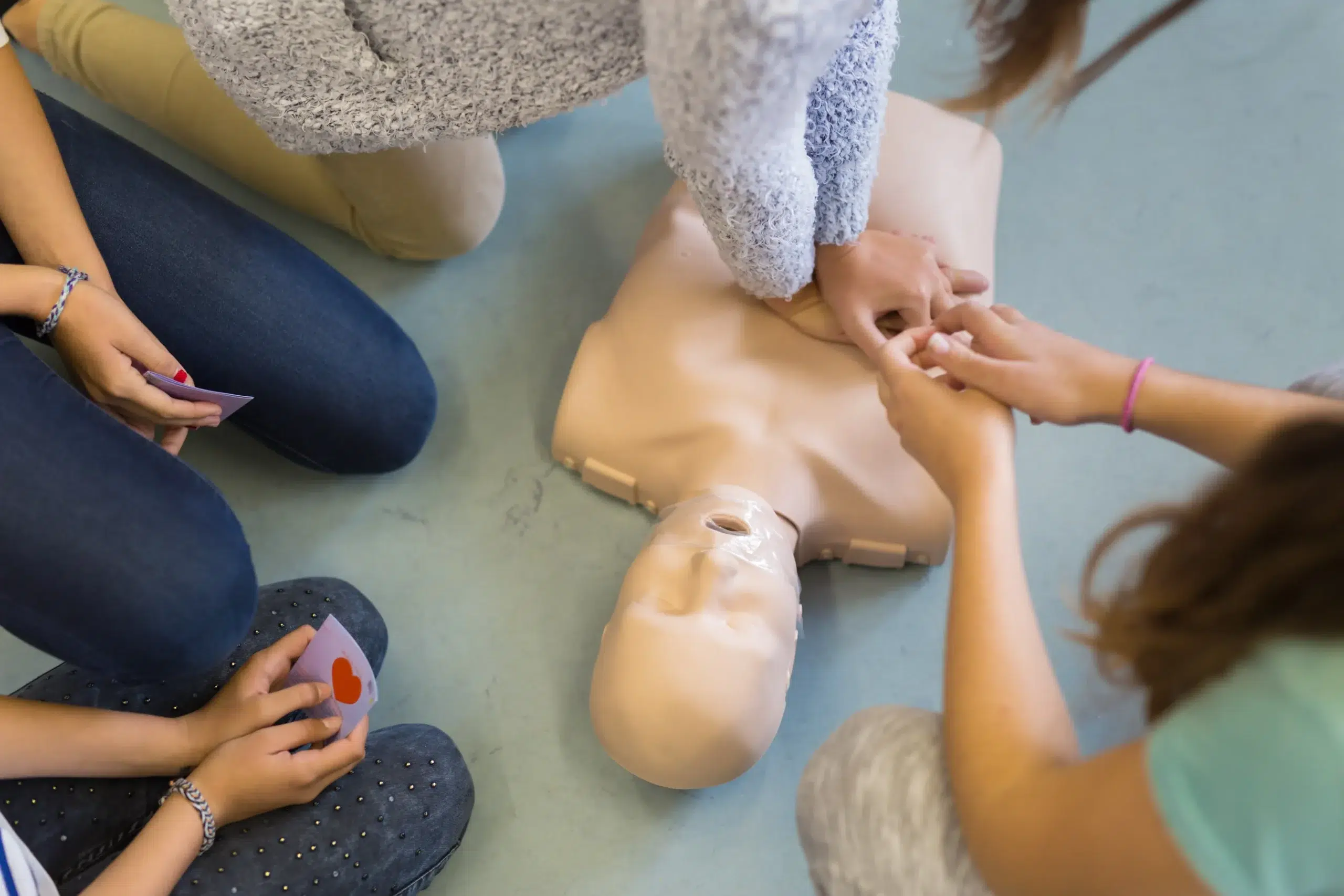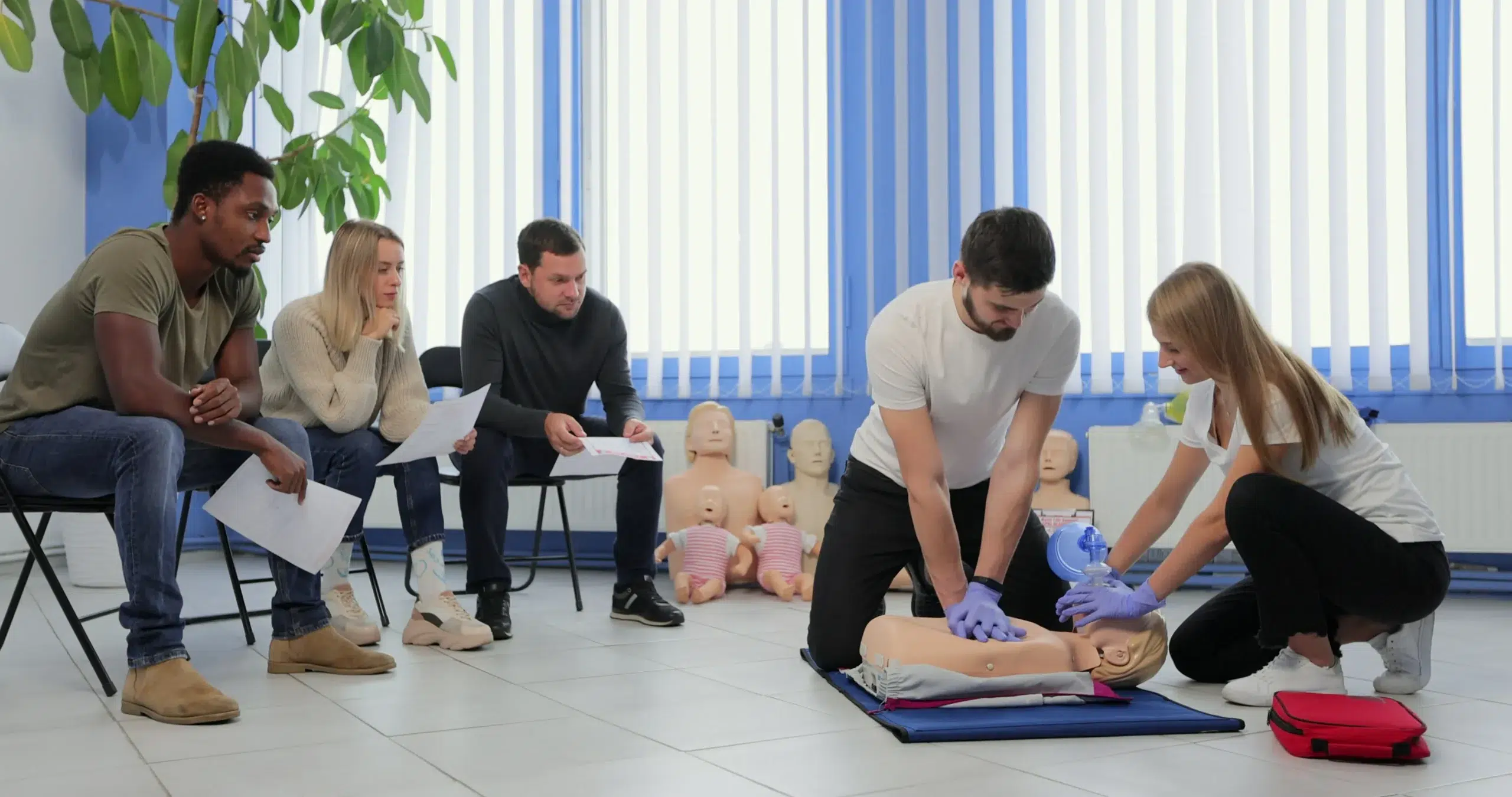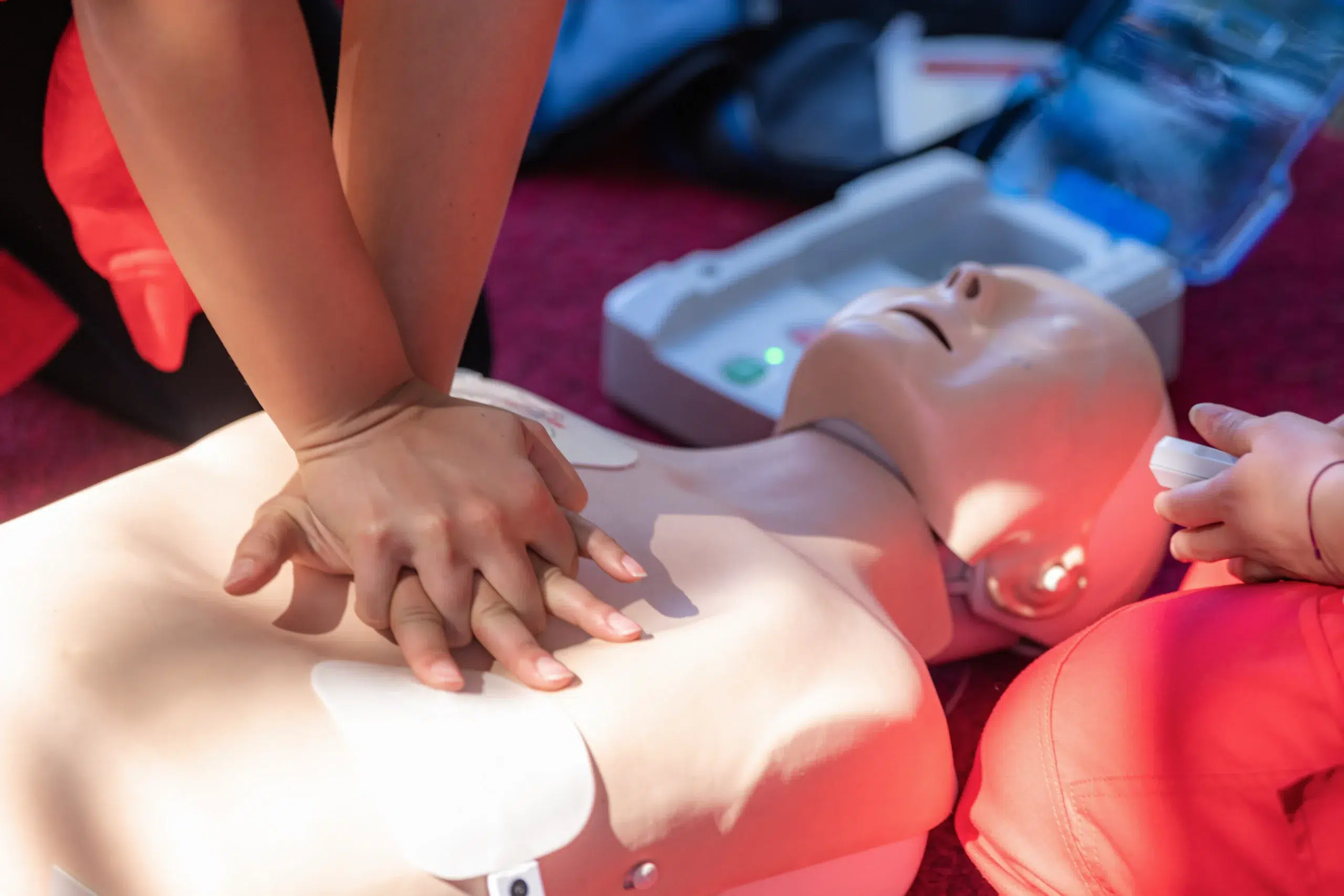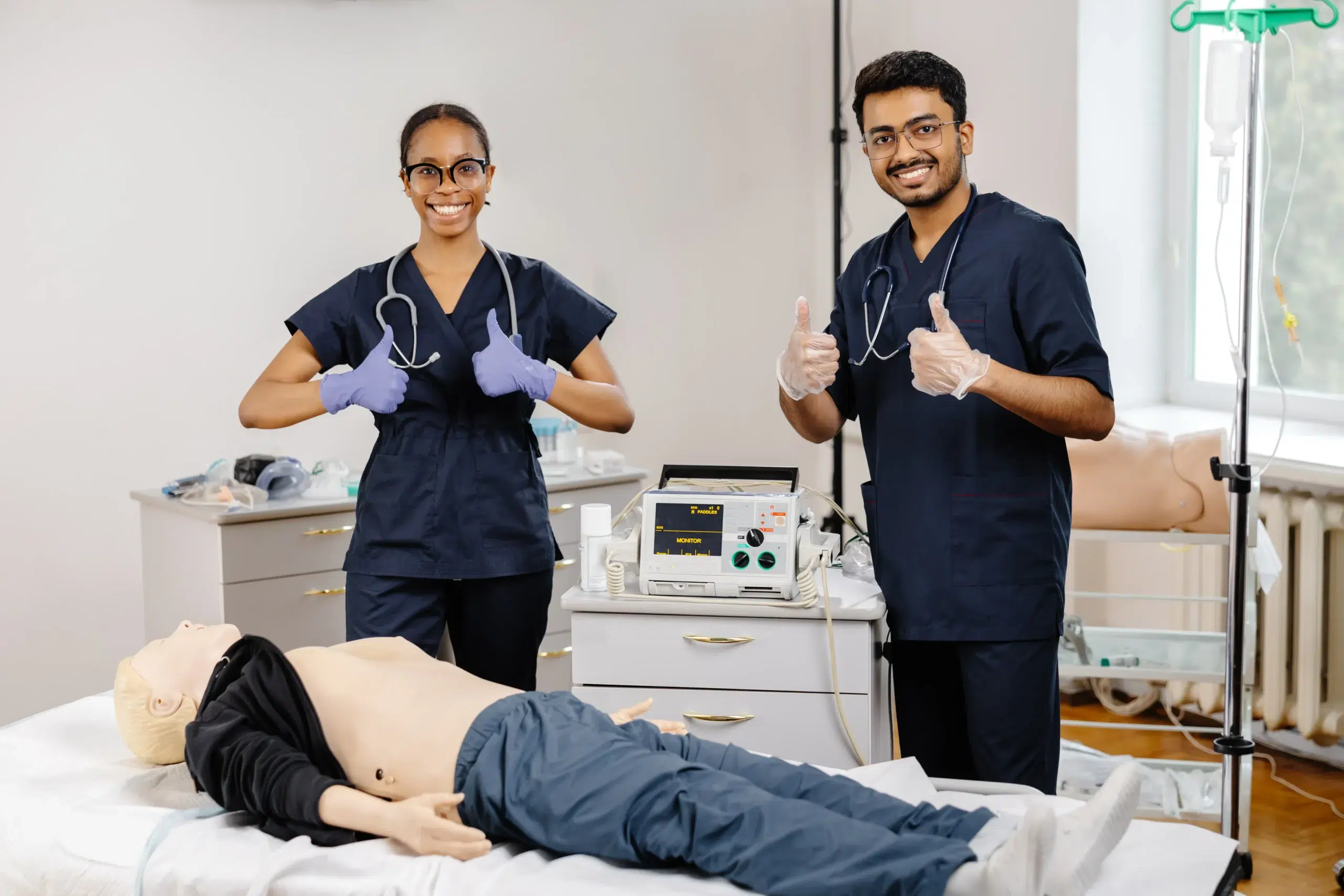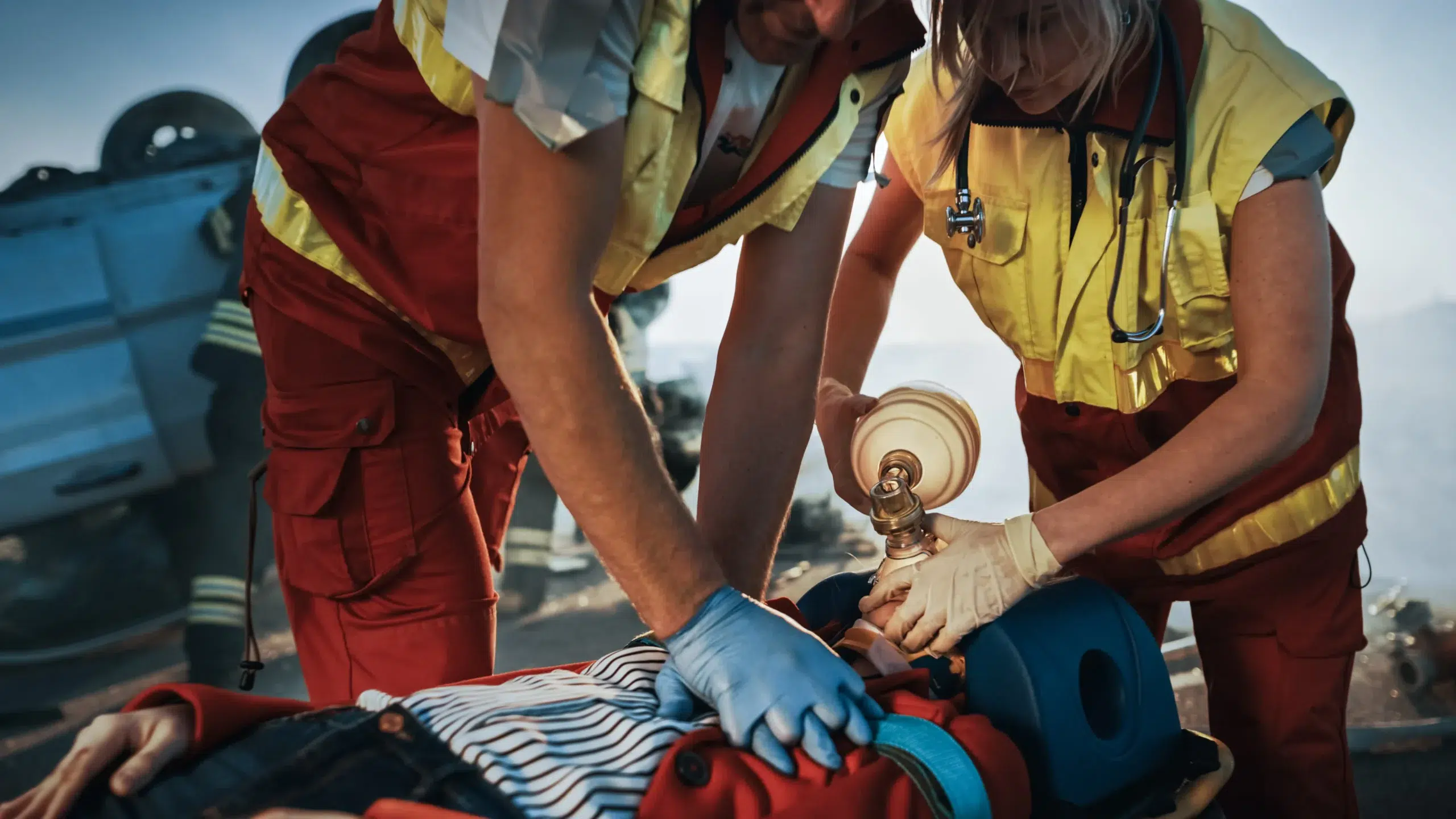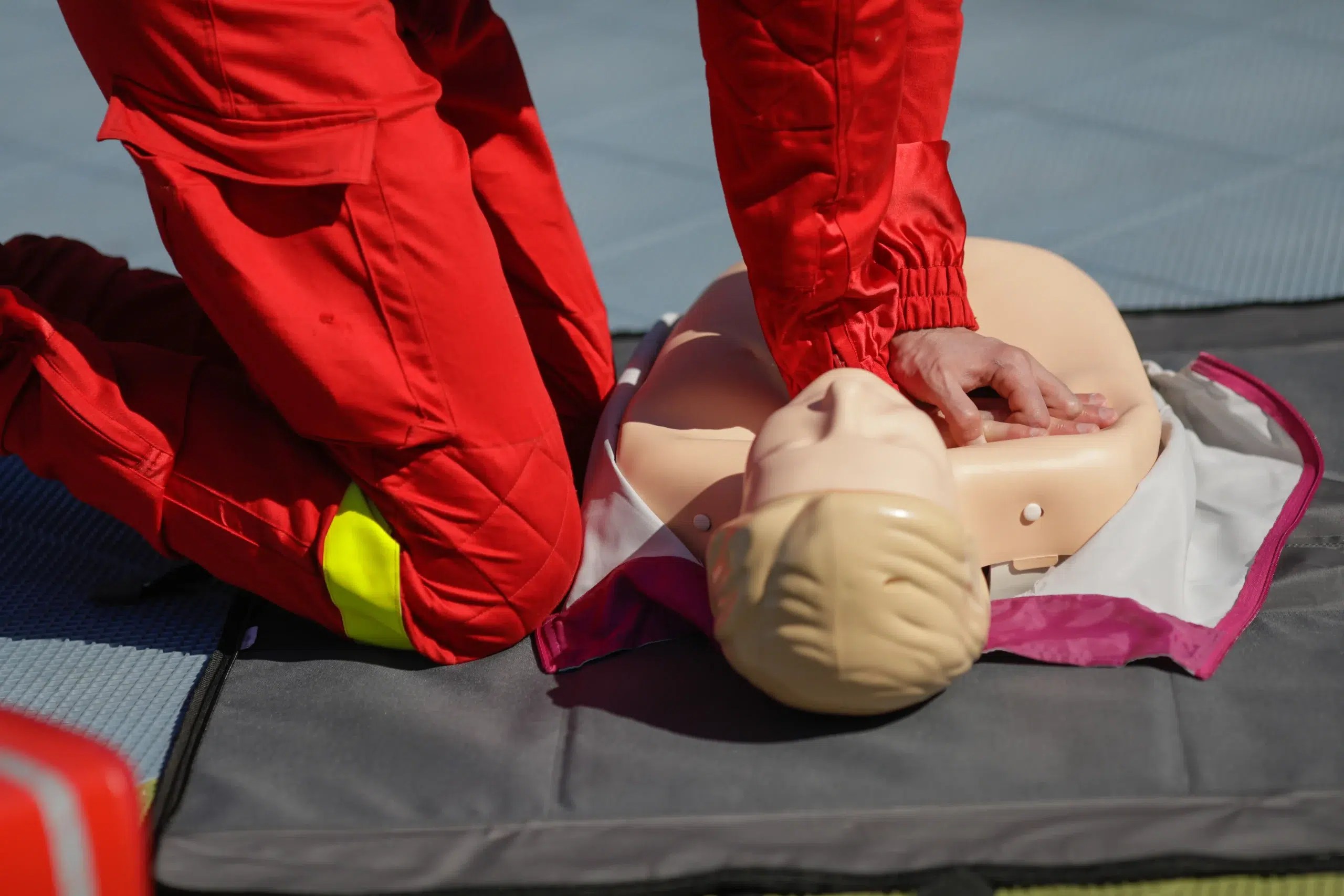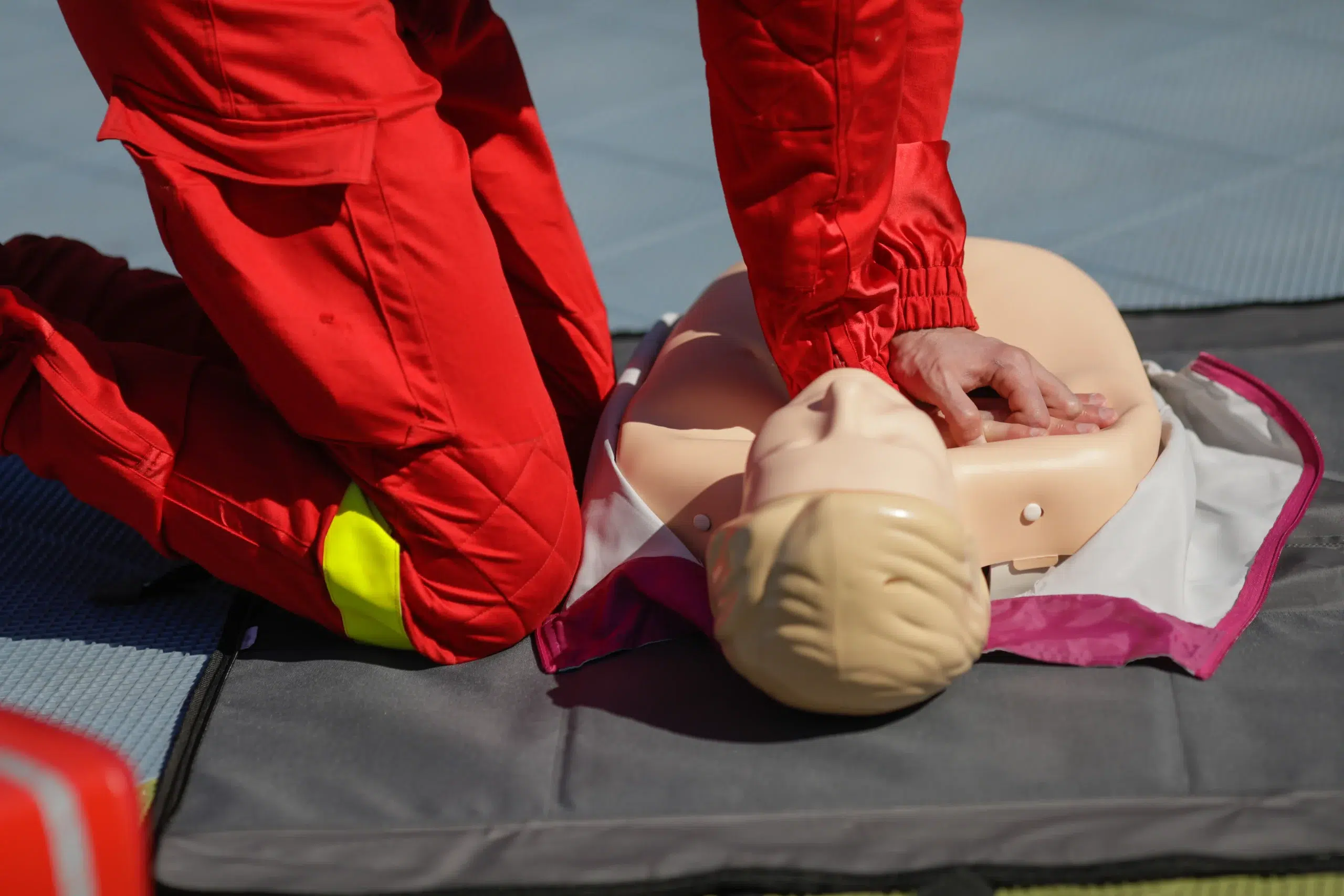Security guards are essential for maintaining order and safety in various settings across San Jose. But their role often extends beyond simply observing and reporting; they are frequently the first responders to medical emergencies. This highlights the vital need for CPR for security guards in San Jose. From bustling shopping centers to quiet residential complexes, security guards are present in locations where medical incidents can occur unexpectedly. This guide provides a comprehensive overview of CPR certification for security guards in San Jose, covering everything from course content and costs to the benefits of combining CPR with other essential safety training. We’ll also address common misconceptions about CPR and guide you through the process of maintaining your certification.
Key Takeaways
- CPR skills are essential for security professionals: Equipping yourself with these skills allows you to confidently handle medical emergencies, potentially saving lives and strengthening your professional standing. It’s a crucial step towards ensuring the safety of those you protect.
- Select a CPR course that meets your needs: Prioritize accredited providers offering hands-on practice, flexible scheduling, and relevant curriculum. Consider factors like the instructor’s expertise and the course format to optimize your learning.
- Stay current with your CPR certification: Regularly renew your certification and pursue continuing education opportunities to maintain your skills and knowledge. Supplement your CPR training with additional certifications like First Aid and AED to enhance your emergency preparedness.
Why Security Guards Need CPR Certification
Security guards are often the first on the scene during emergencies. Think about it: they’re present in office buildings, shopping malls, hospitals, and residential complexes—places where unexpected incidents can occur. From sudden cardiac arrests to slips and falls, a security guard’s quick response can dramatically impact the outcome. This is precisely why CPR training is so crucial for these professionals. Knowing how to perform CPR and provide immediate first aid can be the difference between life and death. CPR and first-aid training empowers security guards to take decisive action when every second counts.
Security guards are more likely to encounter situations requiring CPR and first aid than the average person. They regularly face situations like choking incidents, allergic reactions, or someone collapsing due to a heart condition. Having the training to respond confidently and effectively is essential. It allows them to provide critical care until paramedics arrive, significantly increasing the chances of survival. Learn more about why CPR training is essential for security guards.
Beyond the immediate impact on someone’s health, CPR certification also enhances a security guard’s professional image. It demonstrates a commitment to safety and preparedness, building trust with the public and employers. Many security companies now list CPR certification as a job requirement, recognizing its value in protecting their employees and the people they serve. It shows you’re not just there to observe and report, but also to act when it matters most. For those seeking information on obtaining CPR certification, several resources are available.
Best CPR Certification Courses for San Jose Security Guards
As a security guard in San Jose, your quick thinking and actions can make all the difference in an emergency. Finding the right CPR certification course is essential. This section highlights reputable training providers in San Jose, focusing on options tailored to security professionals.
Safety Training Seminars
Safety Training Seminars offers convenient BLS certification courses in San Jose, perfect for busy security guards. As a woman-owned American Heart Association Training Center, they provide high-quality training at competitive prices. Their courses prepare you to handle medical emergencies, from cardiac arrest to choking. Visit their site for information on their low price guarantee and course schedules.
American Red Cross
The American Red Cross is a well-known and respected name in emergency preparedness. Their San Jose location offers a variety of CPR and First Aid classes. These courses meet OSHA requirements, often a must-have for security guard positions. The Red Cross offers both in-person and blended learning (online and in-person) to fit your schedule.
Emergency and Health Training Center
The Emergency and Health Training Center provides American Heart Association-certified courses, including CPR, BLS, ACLS, and PALS, covering a range of skills from the fundamentals of life support to advanced cardiac care. They focus on hands-on training in a fun, engaging environment, so you gain practical experience. Serving San Jose and the Bay Area, they offer flexible scheduling.
Just Saving Lives LLC
Need your certification quickly? Just Saving Lives LLC offers one-day BLS certification courses in San Jose. Their streamlined approach helps you learn essential life-saving skills efficiently. They also offer other safety courses, making them a convenient option for all your training needs.
AllCPR San Jose
AllCPR San Jose offers various CPR courses, from basic to advanced. Course lengths vary, with shorter options for basic CPR and longer options for more in-depth training. This allows you to choose a course that matches your current knowledge and certification requirements. They offer both in-person and online classes to suit different learning styles.
CPR Certification Costs & Value in San Jose
Getting CPR certified is an investment in your skills and career, so understanding the costs involved is important. Let’s break down the typical price range, factors that influence pricing, and the overall return on investment for security professionals.
Typical Price Range
CPR certification costs in San Jose, much like in nearby Oakland, can fluctuate. Pinpointing an exact average is tricky because of this range, but you can generally expect to find options from around $50 to upwards of $100. Remember, the value of the training goes beyond the sticker price. Prioritize finding a reputable provider with proper accreditation and a course that fits your needs. Don’t make your decision based on price alone. Consider factors like the instructor’s experience and the overall quality of the program. A slightly higher cost for a comprehensive and respected course can be a worthwhile investment.
Factors Influencing Course Prices
Several factors contribute to the final cost of your CPR certification. The type of course you choose plays a big role. An adult-only CPR course will typically be priced differently than a combined adult, child, and infant CPR course. Also, the course format matters. Online courses tend to be more budget-friendly, while in-person classes offer hands-on learning and direct interaction with instructors. Hybrid courses, combining online learning with in-person skills sessions, offer a nice balance. Finally, the level of certification you pursue (basic CPR, BLS, etc.) will also influence the price. More advanced certifications generally come with a higher price tag.
ROI for Security Professionals
For security guards, the return on investment for CPR certification goes beyond the monetary. This training equips you with the skills to potentially save a life during a cardiac arrest. Studies show that CPR can double or even triple a victim’s survival rate, especially when combined with the use of an AED. Beyond the immediate impact on lives, CPR certification enhances your professional image, builds public trust, and can be a job requirement in many security roles. It demonstrates your commitment to safety and preparedness, making you a more valuable asset in the field. The confidence and competence you gain through training are invaluable, allowing you to react decisively in high-pressure situations. This can bring peace of mind and potentially open doors to career advancement.
Benefits of CPR Certification for Security Guards
As a security guard, you’re often the first responder in emergencies. CPR certification equips you with the skills to handle crises effectively, potentially saving lives. Let’s explore the key benefits:
Improve Emergency Response Skills
Security guards regularly encounter situations requiring immediate action. From sudden cardiac arrest to choking incidents, your swift response can significantly impact outcomes. CPR training provides you with the knowledge and practical skills to assess emergencies, perform chest compressions, and provide rescue breaths, increasing the chances of survival until professional medical help arrives. This training also covers essential first aid techniques for handling injuries like cuts, sprains, and fractures. You can find more information on the importance of first aid and CPR training for security guards at AOESecurity.
Meet Legal Requirements
In many states, including California, CPR certification is often a prerequisite for obtaining a security guard license. This requirement underscores the importance of CPR skills in the security profession. By becoming certified, you demonstrate your commitment to professional standards and ensure you’re legally prepared to handle medical emergencies on the job. Check out ProTrainings for more details on CPR certification requirements for security guards in California. Safety Training Seminars offers courses that meet these requirements. You can find CPR and First-Aid courses on our website.
Expand Job Opportunities
In a competitive job market, CPR certification sets you apart. Many employers prioritize candidates with this qualification, recognizing its value in ensuring workplace safety and preparedness. Holding a valid CPR certification can open doors to more job opportunities and potentially higher earning potential. It demonstrates your proactive approach to safety and your willingness to go the extra mile. Learn more about how CPR training is essential for security guards’ effectiveness at CPR Sacramento.
Build Confidence in Emergencies
Knowing how to respond effectively in a crisis instills confidence. CPR training empowers you to take charge in emergencies, reducing panic and enabling you to provide critical care until paramedics arrive. This confidence not only benefits those you assist but also contributes to a safer and more secure environment for everyone. For further insights into the benefits of CPR certification for security guards, visit CPR AED Course.
What to Expect in a Security Guard CPR Course
Security guard CPR training equips you with the skills to respond effectively to medical emergencies. Let’s break down what a typical course covers:
Course Content & Duration
CPR courses for security guards cover essential life-saving techniques, including adult, child, and infant CPR, AED use, and relief of choking. Some courses also include basic first aid. Basic CPR classes usually take three to four hours for in-person training, while online CPR courses can often be completed in one to two hours. Blended learning, which combines online coursework with in-person skills practice, offers another flexible option. More advanced certifications, such as Basic Life Support (BLS) for healthcare providers, require more comprehensive training and may take longer. For more details on CPR class duration, check out AllCPR San Jose.
Hands-on Practice with Security Scenarios
Since security guards are often the first responders in emergencies, practical training is crucial. Expect hands-on practice with mannequins, simulating real-life scenarios you might encounter on the job. These scenarios could include responding to a heart attack in a shopping mall, assisting a choking victim in a restaurant, or providing first aid to someone injured in a workplace accident. This hands-on training builds confidence and prepares you to react swiftly and effectively under pressure. The importance of immediate care by security guards is highlighted by the NITA.
Common Security Guard Emergencies
Security guards face a wide range of medical situations. Your CPR training will address common emergencies like heart attacks, strokes, choking, and breathing difficulties. You’ll also learn how to manage allergic reactions, seizures, and injuries like cuts, burns, and fractures. AOE Security discusses the importance of first aid training for security personnel and their role in assisting with various medical problems. Recognizing and responding to choking and drowning incidents is also a key training component, as explained by USCPR Online.
Certification Process & Validity
Upon successful completion of the course, including a written exam and skills demonstration, you’ll receive a CPR certification card. Most certifications are valid for two years. The American HealthCare Academy emphasizes the value of a nationally accepted certification. Organizations like the Red Cross also offer CPR certification and provide supplemental online resources. Remember to renew your certification before it expires to maintain your qualifications and demonstrate your commitment to safety.
Choosing the Right CPR Course
As a security guard in San Jose, having the right CPR certification is crucial. But with various courses available, how do you choose the one that best fits your needs? Here’s a breakdown of key factors to consider:
Accreditation & Recognition
Look for CPR courses accredited by nationally recognized organizations like the American Heart Association (AHA) or the American Red Cross. These certifications are widely accepted and demonstrate that you’ve received high-quality training that meets established standards. CPR certification equips you to handle emergencies effectively, giving you the skills and confidence to respond in life-threatening situations. Safety Training Seminars offers AHA-certified courses, ensuring your training aligns with industry best practices.
Course Format (In-Person vs. Online)
Consider your learning style and schedule when deciding between in-person and online CPR courses. In-person classes provide hands-on practice and direct interaction with instructors, typically lasting 3–4 hours. Online courses offer flexibility, allowing you to complete the coursework at your own pace, often within 1–2 hours. Blended learning, combining online modules with in-person skills sessions, offers a balanced approach. Explore the different CPR and First Aid course formats to find what suits you best.
Instructor Qualifications
Choose a course led by certified instructors with extensive experience in emergency medical care. Qualified instructors can provide valuable insights, answer your questions, and ensure you develop the proper techniques. For example, the Emergency and Health Training Center provides AHA-certified courses in the San Jose area, signifying a commitment to quality instruction. This ensures your training is comprehensive and up-to-date.
Schedule Flexibility
Your schedule shouldn’t be a barrier to obtaining CPR certification. Look for courses offered on various days and times, including weekends and evenings, to accommodate your work commitments. Providers like Morgan Hill CPR Classes offer flexible scheduling, making it easier for busy professionals like security guards to get certified. This accessibility ensures that high-quality CPR training is within reach for everyone in the San Jose area.
Maintaining Your CPR Certification
As a security guard, your CPR certification isn’t a one-and-done deal. Staying current with the latest techniques and guidelines is crucial for providing effective assistance during emergencies. This section covers everything you need to know about maintaining your CPR certification in San Jose.
Renewal Requirements
CPR certifications typically expire every two years. Keep track of your expiration date and plan to take a renewal course before it lapses. Renewal courses are designed for those whose certifications are expiring or have recently expired. Don’t let your skills get rusty—timely renewal ensures you’re always prepared to respond effectively. The Red Cross website states that “Certification is valid for two years. Renewal courses are available for those whose certifications are expiring or have recently expired.” You can find Red Cross CPR classes in San Jose on their website.
Stay Current
The medical field is constantly evolving, and so are CPR techniques. Staying current with the latest guidelines is essential for providing the best possible care during emergencies. Regular renewal ensures you’re up-to-date on any changes in procedures or protocols. ProTrainings emphasizes that “Regular renewal of CPR certification is necessary to maintain up-to-date skills and knowledge.” This ongoing education ensures you’re always prepared to handle any situation. You can learn more about CPR certification requirements for security guards in California on their site.
Continuing Education
Even if your certification isn’t due for renewal, consider taking refresher courses or participating in workshops. These opportunities allow you to reinforce your skills, learn new techniques, and stay sharp. A comprehensive guide to CPR certification in San Jose offers valuable resources and information. USCPR Online highlights the importance of continuing education, stating that “Basic Security Guard training offers guards the skills and knowledge to recognize and assist victims of choking and drowning.” This underscores the value of ongoing training for handling various emergency scenarios. Consider supplementing your CPR training with additional certifications like First Aid and AED to further enhance your emergency response capabilities. You can find a variety of these courses offered at Safety Training Seminars.
Combine CPR with Other Essential Safety Training
As a security guard, CPR certification is a crucial first step, but it’s often just one piece of the puzzle. Think of it as your foundation. To truly be prepared for a range of emergencies, consider adding these certifications to your toolkit:
First Aid Certification
First aid certification equips you with the skills to handle a wide array of situations, from minor cuts and burns to more serious injuries like fractures and allergic reactions. Learning how to control bleeding, stabilize injuries, and assess a patient’s condition can significantly impact outcomes while waiting for paramedics. This is especially valuable in environments where immediate access to medical professionals might be limited. For security guards patrolling large venues or working solo shifts, having first aid knowledge can be invaluable. Combine this training with your CPR skills, and you become a much more effective first responder. Many security guard roles even require emergency first aid certification, including CPR and AED use.
AED Training
Automated External Defibrillators (AEDs) are becoming increasingly common in public spaces. Knowing how to use an AED can dramatically increase the chances of survival for someone experiencing sudden cardiac arrest. AED training teaches you to quickly assess a situation, determine if AED use is appropriate, and operate the device safely and effectively. This training often goes hand-in-hand with CPR certification, as the two skills work together to provide comprehensive care during cardiac events. Becoming proficient in both CPR and AED use makes you a vital link in the chain of survival.
Bloodborne Pathogens Training
Security guards frequently encounter situations involving blood or other bodily fluids. Understanding how to protect yourself and others from bloodborne pathogens is essential. This training covers safe practices for handling biohazards, proper use of personal protective equipment (PPE), and how to follow OSHA guidelines for workplace safety. This knowledge not only protects you but also ensures you can provide assistance without putting yourself or others at risk. It demonstrates a commitment to safety and professionalism, which can be a valuable asset in your career. Consider pairing bloodborne pathogens training with your CPR and first aid certifications for a well-rounded approach to emergency preparedness.
CPR Training Myths Debunked
Let’s clear up some common misconceptions about CPR training. These myths can prevent people from learning this life-saving skill, so let’s set the record straight.
CPR Isn’t Just for Medical Professionals
One persistent myth is that only doctors and nurses need to know CPR. The truth is, anyone can learn and perform CPR. In fact, bystanders are often the first on the scene of an emergency. Having CPR-trained security guards on-site can dramatically increase the chances of survival for someone experiencing cardiac arrest. Learn CPR and become equipped to handle such emergencies.
CPR’s Role in Emergency Response
Another misconception is that calling 911 is enough. While calling for professional medical help is crucial, it’s rarely instantaneous. Those first few minutes are critical. Immediate CPR from a trained bystander, like a security guard, can make all the difference. CPR helps maintain blood flow to the brain and heart, potentially doubling or even tripling survival rates in some cases. It bridges the gap until paramedics arrive and take over. For security guards, this immediate response can be invaluable.
The Importance of Hands-Only CPR
Some people hesitate to perform CPR because they’re unsure about mouth-to-mouth resuscitation. The good news is that current guidelines from the American Heart Association prioritize chest compressions. Hands-only CPR is highly effective and empowers anyone to act quickly in an emergency without worrying about the rescue breaths. It simplifies the process and makes it easier for more people to provide immediate assistance, making it a truly accessible life-saving technique.
Find Affordable CPR Certification in San Jose
Getting your CPR certification shouldn’t break the bank. Thankfully, there are several ways to find affordable, high-quality options in San Jose.
Discounts & Promotions
Keep an eye out for discounts and promotions. Many CPR training providers, like Morgan Hill CPR Classes, offer competitive pricing and occasionally run special deals. Check their websites or social media for updates on seasonal promotions or discounts for students, seniors, or groups. A little research can often lead to significant savings.
Group Rates for Security Companies
If you’re a security company looking to certify multiple guards, inquire about group discounts. Many training centers, including CPR Training Center, offer reduced rates for group bookings. This is a cost-effective way to ensure your entire team is certified. These centers often cater to diverse groups, with classes in multiple languages like Spanish and Vietnamese, making training accessible to a wider range of employees.
Low Price Guarantees
Some CPR training providers offer low-price guarantees. Safety Training Seminars, for example, has a low price guarantee, matching competitor pricing. Before committing to a course, compare prices and check if a provider offers a price-matching policy. This gives you peace of mind knowing you’re getting the most competitive rate. McGrew & Associates, for instance, offers a price match for their Guard Card class (just show them a competitor’s ad). This type of guarantee can be particularly helpful for security companies seeking budget-friendly training.
Related Articles
- How Long Does CPR Certification Last? A Complete Guide – San Jose CPR Classes
- San Jose CPR Classes: Find Certification Near You – San Jose CPR Classes
- First Aid Training in San Jose: Your Guide – San Jose CPR Classes
- CPR & First Aid Training in San Jose: Your Guide – San Jose CPR Classes
- History of CPR & San Jose CPR Classes – San Jose CPR Classes
Frequently Asked Questions
Why is CPR certification important for security guards? Security guards are often the first responders in emergencies, making CPR certification vital. It equips them to provide immediate care during incidents like heart attacks, strokes, and choking, potentially saving lives before professional medical help arrives. This training also enhances their professional image and can be a job requirement.
How much does CPR certification cost in San Jose? CPR certification costs in San Jose typically range from $50 to $100, depending on factors like the course type (adult, child, infant), format (online, in-person, blended), and certification level (basic CPR, BLS). Look for reputable providers offering competitive pricing and consider the value of the training beyond the cost.
What does a CPR course for security guards cover? A typical security guard CPR course covers essential life-saving techniques, including adult, child, and infant CPR, AED use, and relief of choking. Some courses also include basic first aid. The training often involves hands-on practice with mannequins, simulating real-life scenarios security guards might encounter.
How do I choose the right CPR course in San Jose? Consider accreditation (AHA or Red Cross), course format (online, in-person, blended), instructor qualifications, schedule flexibility, and cost when choosing a CPR course. Prioritize reputable providers with experienced instructors and a format that suits your learning style and schedule.
How do I maintain my CPR certification? Most CPR certifications are valid for two years. Renew your certification before it expires by taking a renewal course. Stay current with the latest CPR guidelines and techniques by participating in refresher courses or workshops, even if your certification isn’t due for immediate renewal. Consider adding certifications like First Aid, AED, and Bloodborne Pathogens to enhance your skills further.


